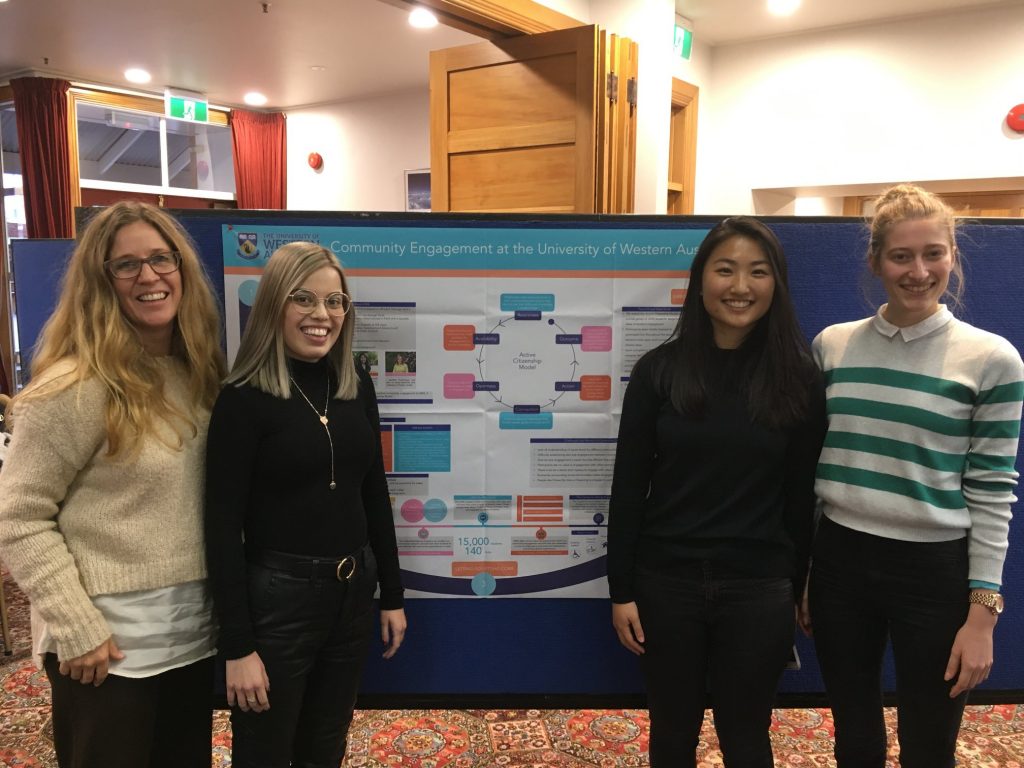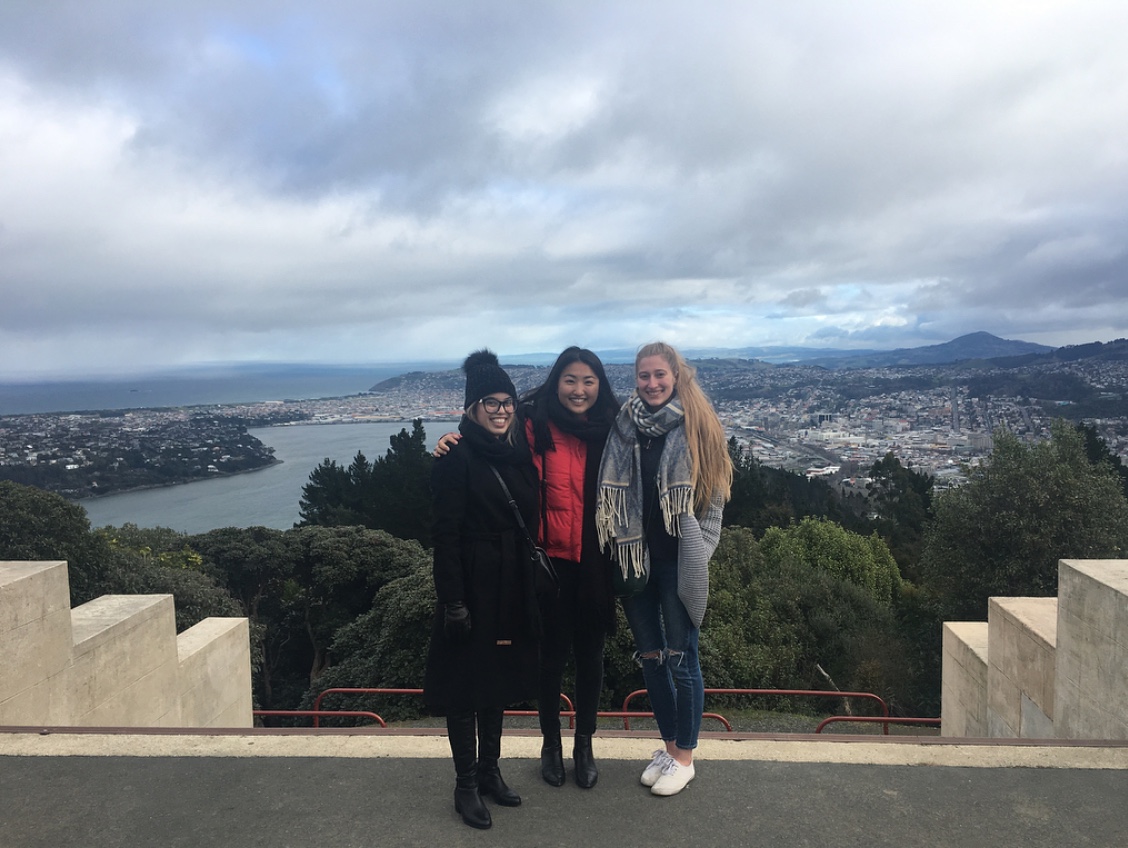Myself and fellow UWA students, Helena and Maddi, together with the Academic Coordinator of the McCusker Centre for Citizenship, Dr Chantal Bourgault Du Coudray, recently returned from the Matariki Global Citizenship Forum in New Zealand, or, as I like to call it, the Forum to Rule Them All (it’s a Lord of the Rings reference – keep up). The aim was to return with the Ring (yes, I’m aware Frodo’s goal was to return without the Ring, but let me keep this metaphor alive), AKA ideas and plans for improving community engagement and active citizenship at UWA.
Our week in New Zealand was a whirlwind, both figuratively and literally; Dunedin was blustery and cold, and every moment was filled with an interactive workshop, enlightening lecture, empowering discussion with community leaders, or a delicious meal – seriously, our hosts at the University of Otago fed us very well! Needless to say, we left the Forum with very full brains and very full bellies! I learned far too much to relay here, so instead, I’ll share some key ideas that resonated with the UWA delegation.
One challenge common to UWA and other universities represented at the Forum, is that of motivating students to engage with their communities. As such, we were introduced to the concept of the ‘action gap.’ Imagine, for each issue within the community, there is a spectrum of engagement upon which everyone sits. To illustrate, I’ll use Australia’s practice of processing asylum seekers offshore as an example. At one end of the spectrum are the actively engaged. They attend protests brandishing signs that read “Bring Them Here” and tweet at Government Ministers to #closethecamps. At the other end, are the actively opposed. They attend Reclaim Australia rallies, or sell their Fish and Chip shops to become dangerously uninformed Senators (for reference, google “please explain”). In between these groups though, are people that care about the issue but aren’t actively engaged, people that are neutral, and people that are opposed but again haven’t taken action. The important group is the passive caring group, where the action gap refers to that gap between caring and action. So, returning to the issue of encouraging students to engage with their communities, we would be wasting our time and energy waxing lyrical about this kind of active citizenship to anyone on the opposition side of the spectrum as they simply won’t be converted or engaged. Instead, it would be most effective to focus on moving students in a passive caring state to an active caring state.
So, how do we do this? While this passive caring group don’t need convincing of the issue’s importance, they face barriers to engagement. Practical barriers include a lack of time and money, such that students need jobs and have no time for volunteering. This is where it is important for there to be some incentive for engagement, or value in the experience for both parties. For example, through the McCusker Centre for Citizenship at UWA, students can undertake an internship with a community organisation as a credited unit, allowing them to easily fit service into their schedule, move closer to finishing their degree, and gain real-world experience valued by future employers. Yet, this is not an infallible solution, because for students to engage with communities, they must be aware of opportunities to engage with communities, and often, they’re not. We need to make students aware of the options they have for engagement whilst at university, and perhaps more importantly, options to sustain that engagement after graduation. After all, for citizenship pursuits to have real impact, they should be sustainable rather than temporary and performative. We want to ensure students understand how they can continue to use their skills and knowledge for good beyond their internship experiences and university experiences, helping them build active citizenship habits early in their professional lives so it becomes easy to fit citizenship into their futures.
 As such, Forum delegates highlighted the need for students to see different ‘pathways to citizenship’ represented in the world around them. You don’t need to take vows of poverty, chastity, and obedience and become a missionary in Malawi, nor do you have to commit to a career in the not-for-profit sector, to meaningfully impact the world. There are countless ways to be an active citizen doing good in your everyday life, but many students don’t see them, and therefore, don’t know they exist. We discussed the importance of mentorship and representation, especially from people that current students can relate to, like those in the early and mid-stages of their careers, whose citizenship pursuits seem attainable.
As such, Forum delegates highlighted the need for students to see different ‘pathways to citizenship’ represented in the world around them. You don’t need to take vows of poverty, chastity, and obedience and become a missionary in Malawi, nor do you have to commit to a career in the not-for-profit sector, to meaningfully impact the world. There are countless ways to be an active citizen doing good in your everyday life, but many students don’t see them, and therefore, don’t know they exist. We discussed the importance of mentorship and representation, especially from people that current students can relate to, like those in the early and mid-stages of their careers, whose citizenship pursuits seem attainable.
Since returning from the Forum, the delegates and the McCusker Centre’s Student Advisory Committee have begun working to make these goals a reality. Moreover, the Centre already has programs established aiming to address students’ lack of awareness about active citizenship options beyond university. The Pathways to Citizenship unit literally invites students to explore how their individual talents, experiences, and values can help them find their own unique ways of contributing to society. Obviously, it’s not feasible to expect all students to take this unit, which is why we hope to make some key lessons accessible through events and programs we can’t wait to develop throughout coming semesters.
We’ve returned from Mordor – I mean New Zealand – with refreshed enthusiasm and an abundance of ideas we’re excited to work on. We’re looking forward to ensuring that what happened in Otago doesn’t stay in Otago, converting talk into action so we can help students begin their active citizenship journeys at university and follow that path throughout their lives.
This article was written by Shakira Donovan, a student delegate at the 2018 Forum. To get in touch, e-mail: 21319422@student.uwa.edu.au

